How Cardinal Bird Food Makes Chickens Sick
Feeding your chickens cardinal bird food can introduce harmful toxins like aflatoxins and solanine. These substances induce lethargy, respiratory distress, and neurological impairments in chickens.
Symptoms also include diarrhea, ataxia, and decreased appetite, leading to reduced egg production and hormonal imbalances. Long-term, your chickens risk liver damage and immunosuppression, affecting overall growth and nutrient balance.
Chickens require specific nutrients such as protein, vitamins, and minerals, not present in cardinal bird food. To prevent accidental poisoning, secure chicken feed in airtight containers and consult a veterinarian if symptoms appear.
To learn more about safe feed practices, you can explore additional information.
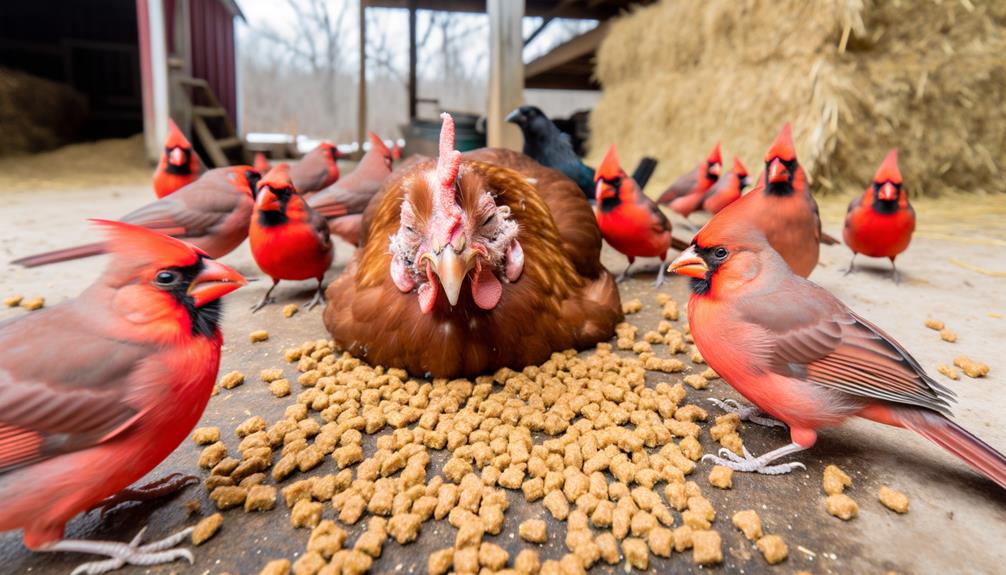
Key Takeaways
- Cardinal bird food contains harmful toxins like aflatoxins, solanine, ochratoxin, and zearalenone which can make chickens sick.
- Symptoms of toxin ingestion in chickens include lethargy, diarrhea, respiratory distress, ataxia, and decreased appetite.
- Consuming cardinal bird food can significantly reduce the quantity and quality of chicken egg production.
- Long-term consumption can lead to severe liver damage, immunosuppression, and nutrient imbalances in chickens.
- Prevent accidental ingestion by storing bird food in secure, airtight containers and clearly labeling them.
Common Ingredients in Cardinal Food
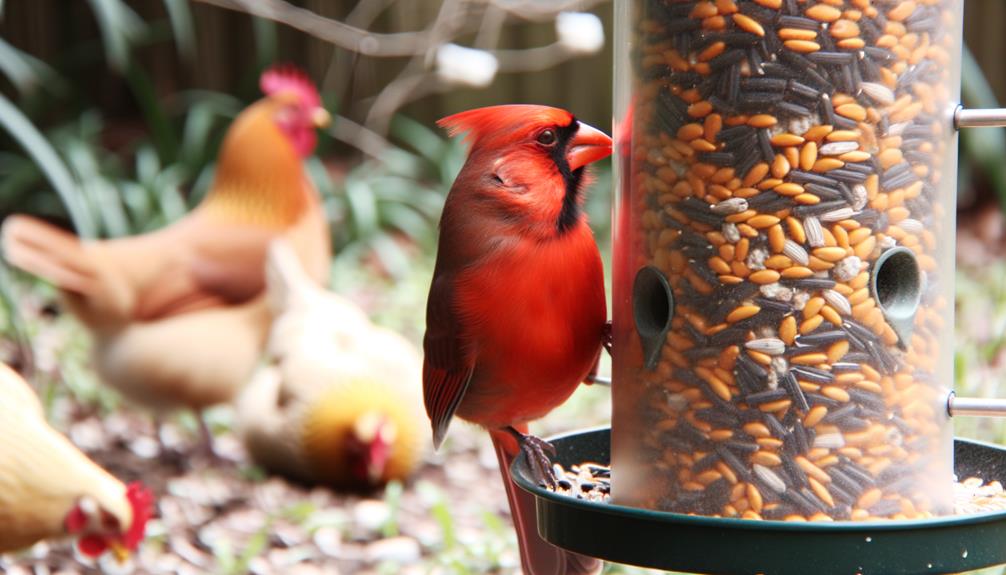
Cardinal food commonly contains a variety of seeds, including sunflower seeds, safflower seeds, and millet. You'll find these seeds offer high-fat content and essential nutrients, beneficial for cardinals' metabolic needs.
Sunflower seeds, rich in oils, provide energy, while safflower seeds are known for their protein and fat content. Millet, smaller in size, offers carbohydrates and fiber, aiding in digestion.
However, if you're considering feeding chickens, you must understand that their dietary requirements differ significantly. Chickens require a balanced mix of proteins, grains, vitamins, and minerals, which cardinal seed blends might lack.
While seeds like sunflower and millet aren't inherently harmful, they don't fulfill the all-encompassing nutritional profile chickens need for best health and egg production.
Toxins Harmful to Chickens
You should be aware that certain common ingredients in cardinal bird food contain toxins harmful to chickens, such as aflatoxins and solanine. When chickens ingest these toxins, they can exhibit symptoms like lethargy, decreased appetite, and respiratory distress.
To safeguard your chickens' safety, consider safe feeding alternatives specifically formulated for poultry.
Common Toxic Ingredients
Several common components in cardinal bird food, such as aflatoxins and certain mycotoxins, can be highly toxic to chickens, leading to severe health issues.
Aflatoxins, produced by Aspergillus fungi, contaminate grains and seeds, causing hepatotoxicity. Mycotoxins, like ochratoxin and zearalenone, disrupt metabolic functions and impair immune responses. These toxins can be inadvertently ingested by chickens, resulting in biochemical imbalances.
Additionally, solanine found in nightshade plants, sometimes included in bird food, exhibits neurotoxic properties that affect chickens' nervous systems.
You must carefully examine feed composition to guarantee it's free from these harmful substances. Adopting this watchful approach ensures your chickens' health and grants you the freedom to maintain a thriving poultry environment.
Symptoms in Chickens
Observing the symptoms in chickens exposed to these toxins can provide critical insights into their health status and the severity of contamination.
You'll notice clinical signs such as lethargy, anorexia, and diarrhea. Chickens might exhibit respiratory distress, characterized by labored breathing and nasal discharge.
Neurological symptoms like tremors, ataxia (loss of coordination), and seizures could indicate severe toxin exposure. Hematological manifestations, including pale combs and wattles, might suggest anemia due to toxin-induced hemolysis.
Gastrointestinal issues, such as crop stasis and vomiting, also arise. Monitoring these indicators helps gauge the extent of toxin impact, enabling timely intervention.
Recognizing these symptoms promptly is essential for preventing long-term damage and ensuring your chickens' well-being.
Safe Feeding Alternatives
Understanding the safe feeding alternatives is crucial to protect your chickens from harmful toxins that can compromise their health. Avoiding cardinal bird food is the first step. Instead, focus on options designed specifically for poultry.
Here are three safe feeding alternatives:
- Commercial Chicken Feed: Formulated with balanced nutrients, it's optimized for chicken health.
- Fresh Vegetables: Carrots, spinach, and broccoli provide necessary vitamins without harmful additives.
- Grains and Seeds: Oats, barley, and flaxseed offer natural energy sources, supporting growth and well-being.
Symptoms of Poisoning
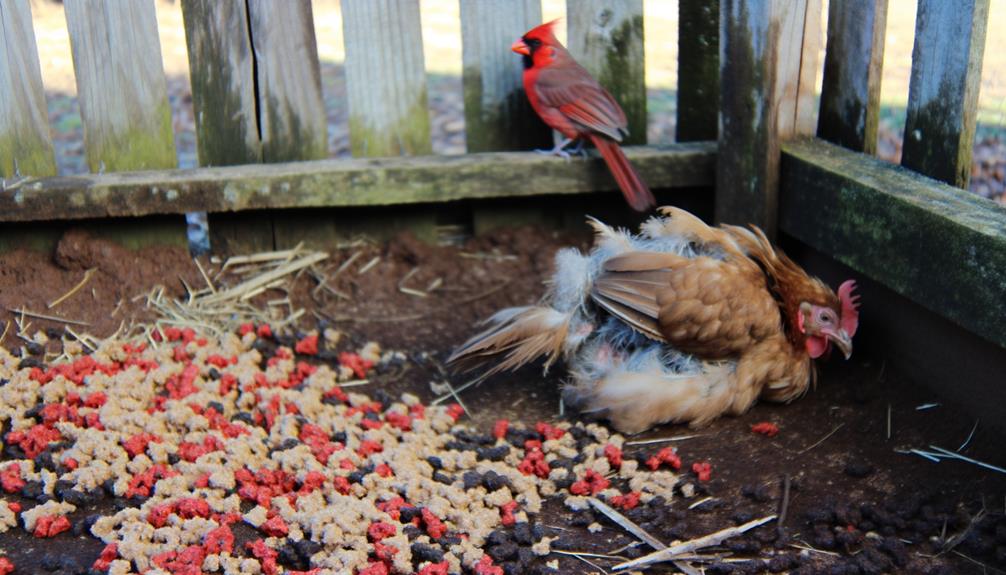
When chickens ingest cardinal bird food, they may exhibit symptoms such as lethargy, diarrhea, and respiratory distress. You might notice your chickens becoming unusually inactive, an early indicator of poisoning.
Diarrhea can follow, characterized by watery or discolored droppings, suggesting gastrointestinal distress. Respiratory distress, marked by labored breathing or wheezing, indicates that toxins could be affecting the respiratory system.
Additionally, observe for signs of ataxia—a lack of coordination that can result from neurological impairments. Chickens might also show decreased appetite and excessive thirst. These symptoms collectively suggest toxic exposure and require immediate veterinary intervention.
Monitoring your chickens' behavior and physical condition is essential to guarantee their well-being and mitigate potential health hazards from improper feed.
Impact on Egg Production
You'll notice that chickens consuming cardinal bird food exhibit a marked reduction in egg production.
This decrease manifests in both diminished egg quantity and compromised egg quality, characterized by thinner shells and irregular yolk consistency.
Understanding these impacts is essential for mitigating the adverse effects on poultry health and productivity.
Reduced Egg Quantity
Consumption of cardinal bird food has been clinically observed to significantly reduce egg production in chickens, impacting overall yield. When chickens ingest this type of feed, the physiological stress induced manifests in several ways:
- Hormonal Imbalance: The altered nutritional profile affects endocrine function, leading to decreased reproductive hormone levels.
- Nutrient Deficiency: Specific nutrients essential for egg production, such as calcium and phosphorus, are missing or insufficient.
- Metabolic Disruption: The feed's ingredients interfere with metabolic pathways, reducing overall energy available for egg formation.
These factors combined result in a significant drop in the number of eggs laid, directly affecting your flock's productivity. Understanding these impacts allows you to make informed decisions, ensuring your chickens are fed appropriately to maintain peak egg production.
Compromised Egg Quality
Ingesting cardinal bird food compromises egg quality by introducing unsuitable ingredients that alter both shell integrity and internal composition. You'll observe that the calcium carbonate content in the food is insufficient, leading to thinner, fragile shells prone to breakage.
Additionally, the internal composition of the eggs changes, with a noticeable decline in albumen quality and yolk color intensity. The presence of anti-nutritional factors in cardinal bird food can also interfere with nutrient absorption, exacerbating the issue.
These changes not only affect the aesthetic and nutritional value of the eggs but can also impact their marketability. By ensuring a diet specifically formulated for chickens, you'll maintain high egg quality and avoid these detrimental effects.
Long-term Health Risks
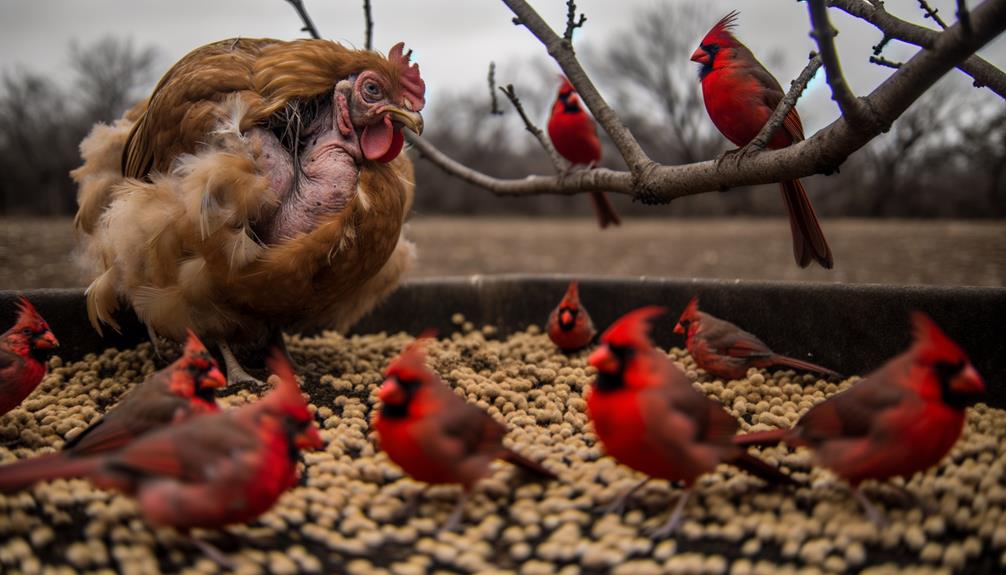
Prolonged exposure to cardinal bird food can lead to significant health issues in chickens, including liver damage and impaired immune function. When chickens ingest this inappropriate diet, they're at risk for several long-term health complications:
- Hepatotoxicity: Continuous consumption can cause liver cells to become inflamed, leading to chronic liver disease.
- Immunosuppression: Nutrient imbalances weaken their immune systems, making them more susceptible to infections and diseases.
- Growth Retardation: Insufficient nutrients can stunt their growth, affecting overall development and productivity.
You'll notice your chickens becoming lethargic and showing signs of illness more frequently.
Monitoring their diet closely is crucial to prevent these severe health risks. Keeping your chickens healthy ensures they thrive, so you can enjoy the freedom of a robust, productive flock.
Safe Alternatives for Chickens
To secure your chickens remain healthy and productive, consider incorporating balanced, poultry-specific feed that meets their nutritional needs.
Commercially formulated chicken feed contains precise ratios of proteins, vitamins, and minerals essential for peak growth and egg production. Avoid feeding chickens seed mixes designed for wild birds, as these often lack necessary nutrients and can contain additives harmful to poultry.
Instead, opt for organic or non-GMO feed options, which eliminate exposure to synthetic chemicals and genetically modified organisms. Additionally, integrating fresh greens, grains, and legumes into their diet can enhance their overall health.
Nutritional Needs of Chickens
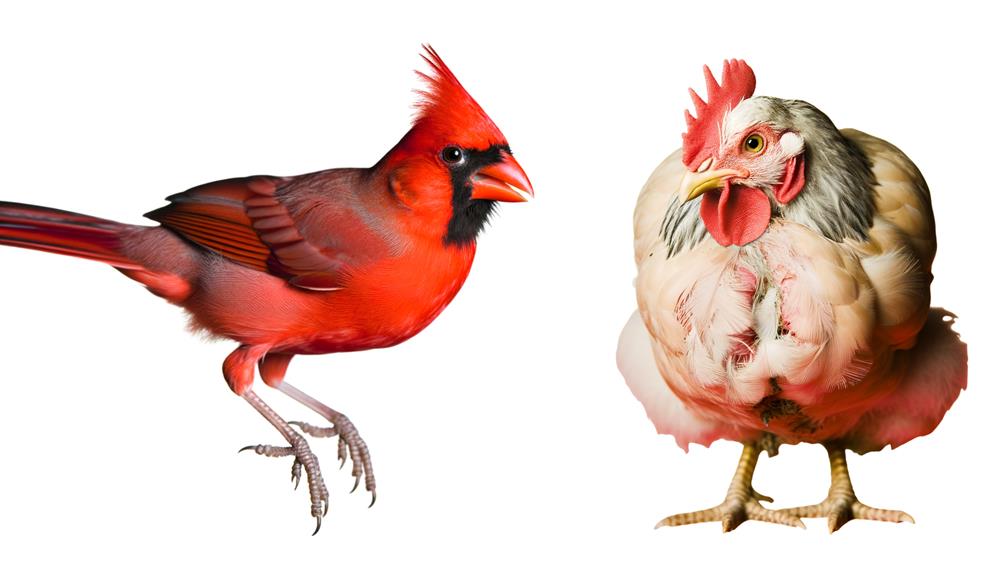
Understanding the nutritional needs of chickens is crucial for guaranteeing their best health and productivity. You must provide a balanced diet to meet their physiological requirements.
Key elements include:
- Protein: Critical for growth, egg production, and feather development. Aim for 16-20% protein in their diet, depending on their life stage.
- Vitamins and Minerals: Essential for metabolic functions. Guarantee adequate levels of calcium for eggshell quality and vitamin D for calcium absorption.
- Energy Sources: Carbohydrates and fats are essential for maintaining body temperature and activity levels. Corn and wheat are excellent carbohydrate sources.
DIY Chicken Feed Recipes
To maximize your chickens receive best nutrition, you can formulate DIY feed using nutrient-rich ingredients like grains, legumes, and seeds. This approach not only meets their dietary requirements but also offers cost-effective solutions compared to commercial feed options.
Nutrient-Rich Ingredients
Crafting your own chicken feed with nutrient-rich ingredients guarantees your flock receives a balanced diet tailored to their specific needs. By selecting high-quality components, you can ensure prime health and productivity in your chickens.
Here's what you should consider:
- Protein Sources: Integrate soybean meal or fish meal, which provide essential amino acids critical for growth and egg production.
- Grains: Utilize whole grains such as corn, wheat, or barley. These provide carbohydrates necessary for energy metabolism.
- Mineral and Vitamin Supplements: Add calcium carbonate and vitamin premixes to support bone strength and overall health.
Each ingredient should be carefully measured to maintain the nutritional balance. By doing so, you'll promote robust immune systems and enhance your chickens' overall essentiality.
Cost-Effective Solutions
Incorporating cost-efficient solutions into your chicken feed strategy can greatly reduce expenses while maintaining nutritional sufficiency. You can create your own feed by using readily available ingredients, guaranteeing your chickens receive essential nutrients without the added cost of commercial products. Here's a detailed analysis of a DIY feed composition:
| Ingredient | Percentage (%) |
|---|---|
| Cornmeal | 50 |
| Soybean meal | 20 |
| Fish meal | 10 |
| Alfalfa meal | 10 |
This mix guarantees a balanced diet, providing proteins, carbohydrates, and essential vitamins. Don't forget to supplement with calcium sources like crushed oyster shells. By controlling the feed composition, you achieve both economic efficiency and prime poultry health, granting you greater autonomy over your farming practices. This approach also minimizes risks associated with commercial feed contaminants.
Expert Recommendations
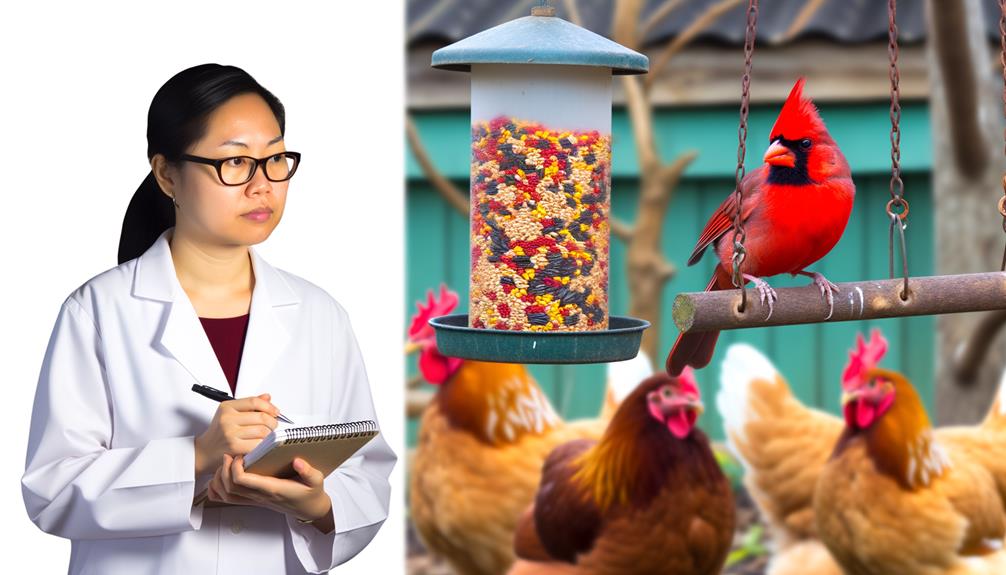
Based on detailed clinical studies and expert analysis, veterinarians strongly recommend discontinuing the use of cardinal bird food in poultry diets to prevent gastrointestinal distress and potential toxicity in chickens.
To safeguard the well-being of your flock, follow these expert recommendations:
- Switch to species-specific feed: Utilize formulated poultry feed designed to meet chickens' unique nutritional requirements.
- Monitor symptoms: Regularly observe your chickens for signs of gastrointestinal distress, such as diarrhea, lethargy, and decreased appetite.
- Consult a veterinarian: Seek immediate professional advice if you notice any adverse reactions after accidental ingestion of cardinal bird food.
Preventing Accidental Ingestion
To prevent chickens from accidentally ingesting cardinal bird food, it's essential to implement secure storage practices and guarantee clear separation between different types of feed. Employing airtight containers for cardinal bird food minimizes the risk of cross-contamination. Additionally, label each container clearly and store them in distinct locations. Regular inspection of feeding areas helps identify and address any potential hazards.
| Feed Type | Container Type | Storage Location |
|---|---|---|
| Chicken Feed | Airtight Bin | Main Feed Storage Area |
| Cardinal Bird Food | Sealed Container | Separate, Elevated Shelf |
| Mixed Grains | Plastic Container | Designated Grain Section |
Maintaining these protocols maintains chickens' health remains uncompromised while allowing you the freedom to manage your feed supplies efficiently.
Conclusion
You've learned that feeding chickens cardinal bird food isn't just risky—it's dangerous. Imagine the vibrant reds and oranges of cardinal food, seemingly harmless, but laced with toxins that wreak havoc on your chickens' health.
Symptoms like lethargy and stunted egg production are just the tip of the iceberg.
Prioritize their specific nutritional needs with DIY feed recipes. Follow expert advice to prevent accidental ingestion.
Safeguard their well-being with informed choices, ensuring a healthy, productive flock.





